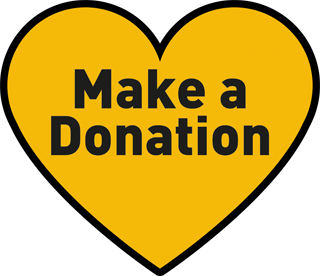Every year, in the countdown to the Lakes International Comic Art Festival, we bring you a series of interviews with guests at the event. Over 70 are attending in 2018 in October (and that’s not including creators you’ll find in the Comics Clock Tower).
This Festival Focus for 2018 is Victoria Lomasko, who graduated from Moscow State University of Printing Arts in 2003, with a degree in graphic art and book design.
She now works as a graphic artist with a focus on graphic reportage. Drawing on Russian traditions of documentary graphic art (as practiced during the Siege of Leningrad, in the Gulag, and within the military), Lomasko explores contemporary Russian society, especially the inner workings of the country's diverse subcultures, such as Russian Orthodox believers, LGBT activists, migrant workers, sex workers, and collective farm workers in the provinces.
Her work has appeared in mainstream print publications in Russia and abroad, and exhibitions in Russia and throughout Europe. er first work was L'art interdit: Art, blasphème et justice dans la Russie de Poutine, published in French Her book Other Russias, a collection of graphic reportages on social themes, was published in the United States by n+1 and the UK by Penguin.
Lomasko has collaborated extensively with various non-profit human rights organisations on creating materials for publication and taught workshops in places of incarceration. She is the co-curator of two long-term art and activism projects: Drawing the Court (with Zlata Ponirovska) and The Feminist Pencil (with Nadia Plungian).
Although Victoria reads English she was more comfortable answering our questions in Russian. We've chosen to include her responses in her original language, with English translation by Carole Tait.
What are you working on, comics-wise, right now, and when will it be published?
Victoria: Дело в том, что я – не комиксист, а художник, который скорее работает в области современного искусства. Я рисую графические репортажи, но это не комиксы, а в последнее время и вовсе занимаюсь монументальными росписями. Прямо сейчас работаю над эскизами для постоянных фресок в галерее Grad, которая базируется в Лондоне в Somerset House.
The thing is that I am not a comic creator, but an artist who works more in the field of contemporary art. My output is graphic reportage, but this is not really comics, and recently I’ve been working on large murals. Right now, I'm working on sketches for permanent frescoes in the Grad Gallery, which is based in London at Somerset House.
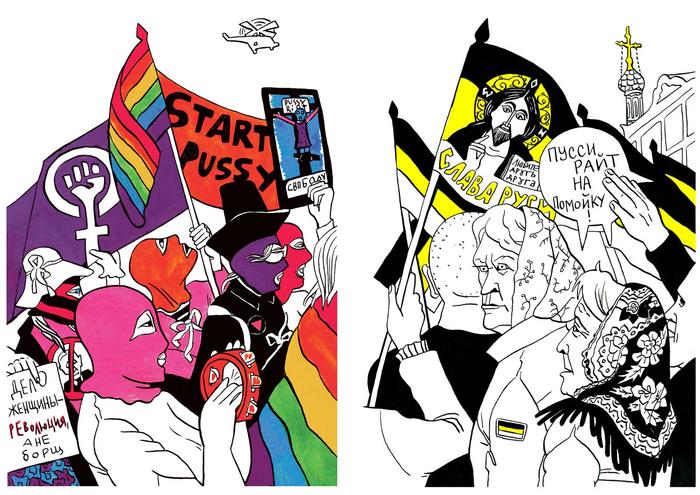
Which comic project you've worked on are you most proud of and where can people see it or buy it?
Victoria: Я горжусь своей книгой “Other Russias”, это сборник графических репортажей, опубликованный сначала в Нью-Йорке в n+1, а затем в Лондоне в Penguin. Книга получила Пушкинскую премию, как лучшая книга о России в переводе за 2017 год.
Комиксы в своей жизни я рисовала так редко, что выбор невелик. Мне нравится комикс, сделанный по заказу сайта ARTE.
Во-первых, это было почти журналистское расследование – я совершила поездку по следам французского фотографа Робера Дуано, который побывал в Сибири, в Академгородке в 1967 году. Во-вторых, комикс был частично превращён в анимацию – персонажи не двигались, но сами кадры постепенно появлялись, уменьшались-увеличивались, накладывались друг на друга. В общем, работа получилась достаточно необычная.
I am proud of my book Other Russias, it is a collection of graphic reports, first published in New York by N + 1, and then in London by Penguin. The book received the Pushkin Prize in 2017 as the best book about Russia in translation.
I have so seldom drawn comics that the choice is small. I like the comic commissioned by ARTE. It started as a journalistic investigation - I made a trip in the footsteps of the French photographer Robert Doisneau, who visited Akademgorodok in Siberia in 1967.
Secondly, the comic was partially animated - the characters did not move, but the footage gradually appeared, increased and decreased in size, images overlapped each other. In general, the work was quite unusual.
How do you plan your day as a creator? (Do you plan your day?)
Victoria: Мне не нравится, когда мои дни похожи один на другой, и это одна из причин, почему я не зарабатываю комиксами – не хочу быть вынужденной сидеть дома и рисовать каждый день определённое количество страниц. Мне нравится собирать материал за пределами дома, и это в чём-то напоминает работу журналиста. Каждый день я что-то делаю для развития в профессиональной сфере, но в последний год стала брать меньше заказов и оставлять больше времени для общения и размышлений. Неожиданно начала писать стихи.
I don't like it when my days are repetitive, and that's one of the reasons why I don't make comics – I don't want to be forced to sit at home and draw a certain number of pages every day. I like to collect material and inspiration from outside the home, more like the work of a journalist.
Every day, I try to do something to further my professional development, but in the last year I have begun to take fewer commissions and leave more time for communication and reflection. Suddenly I’ve started writing poems.
What's the best thing about being a comics creator?
Victoria: В работе над комиксами мне интересней всего придумывать историю и раскадровку. Продумывать связь текста и изображения: какая информация может стать картинкой, как будет выстраиваться ритм между картинкой и текстом, что будет репликами персонажей, а что пойдёт в авторский комментарий.
In my work on comics, I'm more interested in inventing a story and storyboard. Thinking about the relationship between text and image: what information can become a picture, how the rhythm will be built between the picture and the text, how will be the characters be portrayed, and what constitutes the author's commentary.
And the worst?
Victoria: Меньше всего мне нравится отрисовывать готовые полосы. А ведь это и есть основная работа комиксиста! Насколько я знаю художников-комиксистов, обычно это спокойные, уравновешенные люди, то ли склонные к такой упорядоченной работе, то ли ставшими такими от рисования комиксов. Я же гораздо более неспокойный человек.
Drawing the finished strips is my least favourite thing. And this is the main job in publishing comics! As far as I know comics artists, they are usually calm, balanced people, either naturally inclined to such orderly work, or they have become so from drawing comics. I'm a much more troubled person.
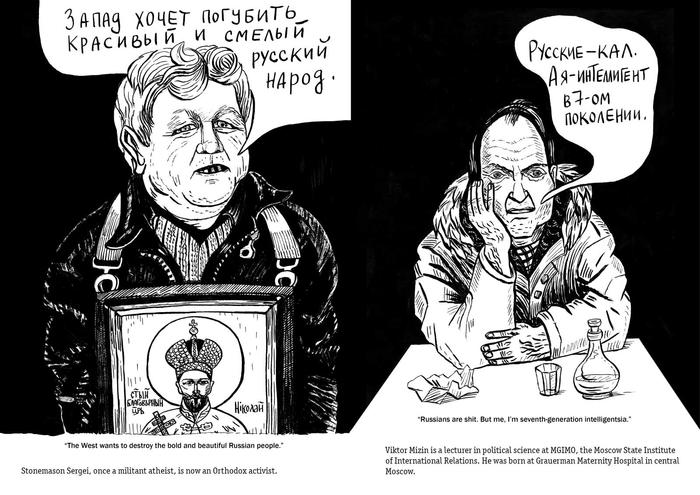
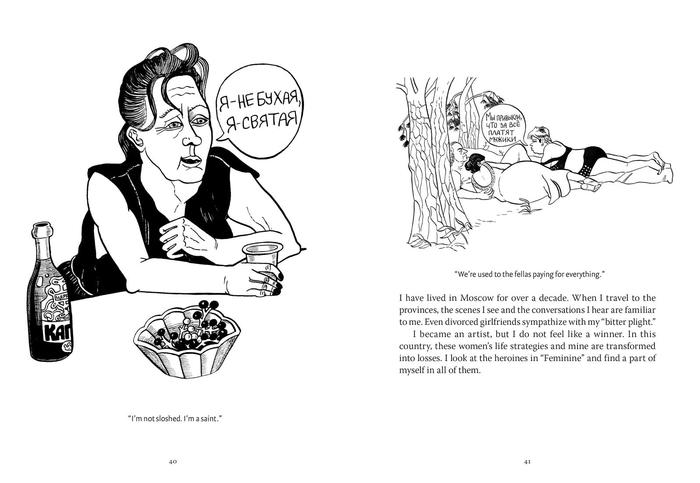
What most distracts you from getting your work done?
Victoria: Experiences related to personal relationships.
Do you think it's easier or harder for young comic creators to get published today?
Victoria: Думаю, это сильно зависит от конкретной страны. Насколько знаю, в Германии сейчас быстро развивается комиксная индустрия и, вероятно, возможностей для художников становится больше. Во Франции множество изданий, публикующих комиксы, но и хороших комиксистов больше, чем где бы то ни было.
В России известных комиксистов можно пересчитать по пальцам одной руки, но при этом нет ни одного сайта или журнала, специализирующегося на комиксах. Из хорошего – у нас есть отличное издательство «Бумкнига», издатель которого Дмитрий Яковлев выпускает на русском самые интересные и знаковые комиксы, такие, как «Персеполис» или «Фотограф». Дмитрий настроен публиковать и российских авторов, но пока у нас не очень много художников, готовых рисовать целые книги, а не отдельные короткие истории. Аудитория в России тоже пока только формируется. Поколение 40+, выросшее в Советском Союзе не привыкло к комиксам и не умеет их читать, если кто-то и интересуется комиксами, то это молодёжь в крупных городах, в первую очередь в Москве и Петербурге.
I think it depends very much on the country. As far as I know, the comic industry is rapidly developing in Germany and there are probably more opportunities for artists. In France, there are a lot of publishers producing comics, and probably better comics than anywhere else.
In Russia, well known comics can be counted on the fingers of one hand, and there is no site or magazine specialising in comics. We do have an excellent publishing house, Boomkniga; Dmitry Yakovlev is the publisher and he publishes the most interesting and iconic comics in Russian, for example, Persepolis or Photographer.
Dmitry is also willing to publish Russian authors, but so far we don’t have many artists ready to draw whole books, instead of separate short stories.
The audience in Russia is also in the process of developing. The over forties, having grown up in the Soviet Union, are not accustomed to comics and don’t know how to read them. If someone is interested in comics, it’s generally young people in big cities, particularly Moscow and St Petersburg.
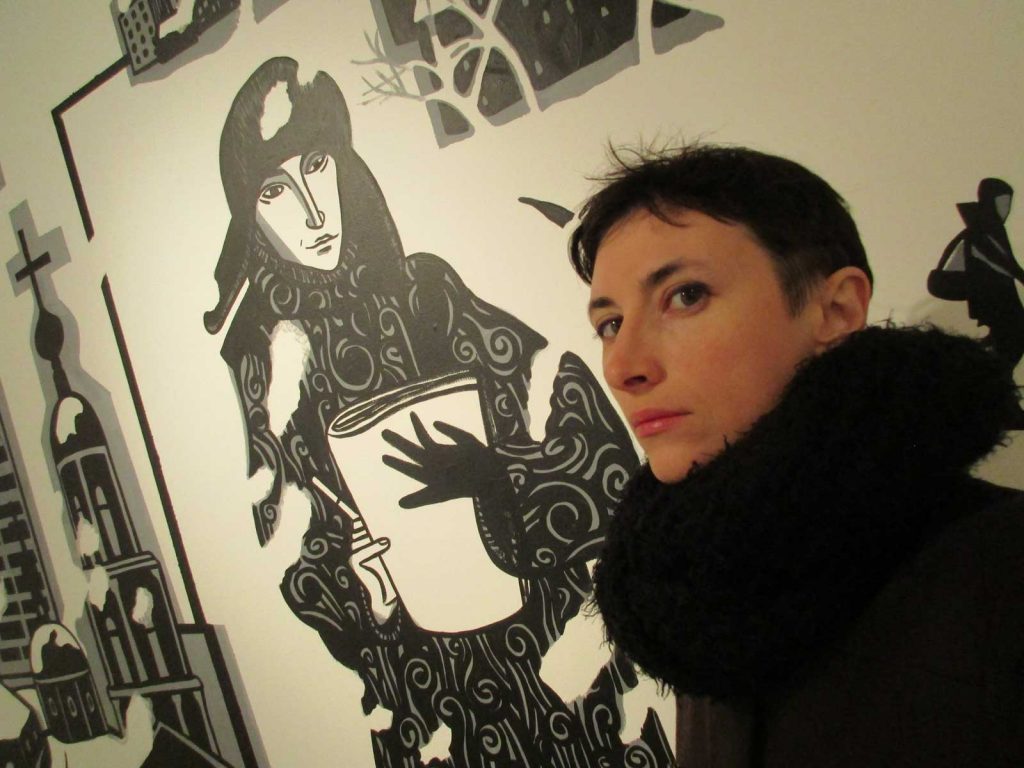
Have you ever been to the Lake District before and if so what did you think of it? If you haven't, what are you expecting?
Victoria: Никогда раньше не слышала о the Lake District и не знаю, чего ожидать. Но очень интересно снова побывать в Англии, потому что, на мой взгляд, самые интересные вещи в культуре происходят в англоязычном мире. К сожалению, пока я совсем не знаю английских комиксистов, так что буду рада познакомиться с их работами. А также буду рада рассказать про графические истории в России, думаю, вы о нас тоже ничего не знаете.
I had never heard of the Lake District before and I don't know what to expect. But I’m very happy to visit England again, because, in my opinion, the most interesting things in culture occur in the English-speaking world.
Unfortunately, I don’t currently know much about English comics, so I will be very happy to learn more. I would also be happy to tell everyone about graphic history in Russia, I think few people know about that either.
Which one comic creator would you most like to meet, and why?
Victoria: Всегда хотела познакомиться с Джо Сакко, потому что он круче всех в области графической журналистики. Являясь настоящим журналистом, он очень чётко выстраивает свои истории, ясно показывает свою позицию и отвечает за слова. Ещё мне нравится его едкий юмор и самоирония. Часто авторы графических репортажей великолепно рисуют, но их политические взгляды непонятны, они не берут полноценных интервью и иногда оправдываются в своих текстах: «Это моё субъективное мнение о ситуации, не судите строго. Я же всего лишь художник».
Джо Сакко написал blurb на обложку “Other Russias”. И во время своего тура по Америке я смогла познакомиться с ним в Портленде, где он живёт. Кстати, это он порекомендовал меня на the Lake District.
I've always wanted to meet Joe Sacco, because he's the coolest in the field of graphic journalism. Being a real journalist, he very clearly builds his stories, clearly shows his position and takes responsibility for the words. I also like his caustic humour and irony. Often authors of graphic reports draw beautifully but their political views are unclear, and they don’t always have the courage of their convictions: "This is my subjective opinion about the situation, please do not judge me. I'm just an artist. "
Joe Sacco wrote some copy for the cover of Other Russias. And during my tour of America, I was able to meet him in Portland, where he lives.
By the way, it was he who recommended the Lake District to me!
How do Festivals and other comics events help creators most, do you think?
Victoria: Международные фестивали помогают за один раз посмотреть подборку работ художников из разных стран – с какими темами они работают, какие техники и стили используют. После этого в голову могут придти новые идеи. Обычно на фестивалях случаются новые знакомства, новые предложения, после участия в них расширяется читательская аудитория.
International festivals help you to see a selection of works by artists from different countries – which themes they explore, what techniques and styles they use. That can always inspire new ideas. Usually at festivals you meet new people, new ideas, and comics readers are introduced to new artists.
What one piece of advice do you offer people looking to work in the comics industry?
Victoria: Мне трудно сказать, я же не работаю в комикс-индустрии, и как вы уже поняли, в России такой индустрии просто нет. Думаю, в любой работе самое главное любить её, и быть настойчивым и последовательным в ней.
It’s hard to say, as I don’t work in the comics industry, and as I have already explained, in Russia there really isn’t one. I think in any work the most important thing is to love what you do, and to be persistent and consistent.
What's your favourite comic right now and where can people get it?
Victoria: Хочу порекомендовать к прочтению комикс «Фотограф». У книги три автора: Эммануэль Гибер, Дидье Лефевр и Фредерик Лемерсье. Известный французский комиксист Эммануэль Гибер придумал, как можно собрать в сложное и законченное произведение тысячи фотографий Дидье Лефевра, сделанные в Афганистане в 1986 году. Между кадрами с фотографиями художник выстраивает дополнительные кадры, в которых нарисовал то, что происходило с самим фотографом: как, где и почему были сделаны им именно эти фото?
Я прочитала за одну ночь захватывающую историю о том, как французский фотограф вместе с секретной миссией «Врачей без границ» нелегально проникает в Афганистан, где идут военные действия. Фотографии Лефевра выглядят мощным свидетельством, лёгкие рисунки Гибера кажутся нарисованными на одном дыхании, макет Лемерсье безупречен. Большое спасибо питерскому издательству «Бумкнига», которое издаёт на русском такие книги.
[caption id="attachment_100591" align="aligncenter" width="870"] Boomkniga Russian language edition of the graphic novel "The Photographer", by Emmanuel Guibert, Didier Lefèvre, and Frederic Lemercier, first published by Dupuis[/caption]
I would like to recommend The Photographer, by Emmanuel Guibert, Didier LeFevre and Frederick Lemercier, which interweaves Lefèvre's black-and-white photographs and Guibert's illustrations, combined with captions and word balloons, to create the narrative.
Emmanuel Guibert is a famous French comics creator who invented the technique of assembling, in a complex and finished product, thousands of the photos by Didier, taken in Afghanistan in 1986. Between frames, with photos, the artist builds up additional frames in which he painted what happened to the photographer. It begs the question how, where and why were these photos taken?
In the course of one night I read a fascinating story about how a French photographer accompanying a secret mission of ‘Doctors Without Borders’ illegally infiltrated a war zone in Afghanistan. Lefebvre’s photos are powerful, Guibert’s drawings have a lightness of touch, and Lermercier’s layout is flawless. Many thanks to the St Petersburg publishing house Boomkniga, which publishes such books in Russian.
Victoria, thank you very much for your time and for answering our questions. We look forward to seeing you in Kendal!
• The Lakes International Comic Art Festival will be back in Kendal 12th – 14th October 2018. Tickets for the Festival are on sale now from: www.comicartfestival.com
• Follow the Lakes International Comic Art Festival on Facebook | Twitter | Podcast

